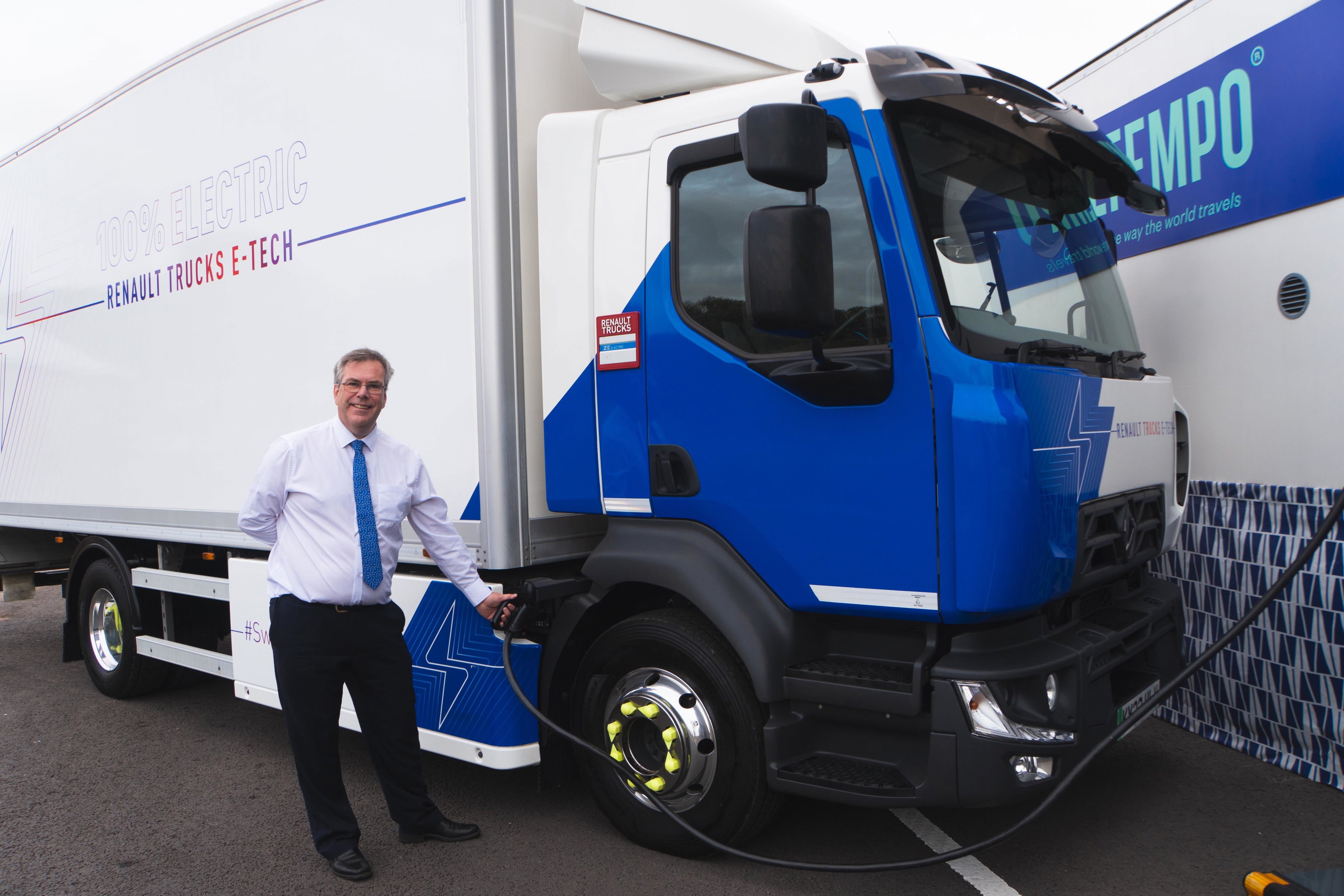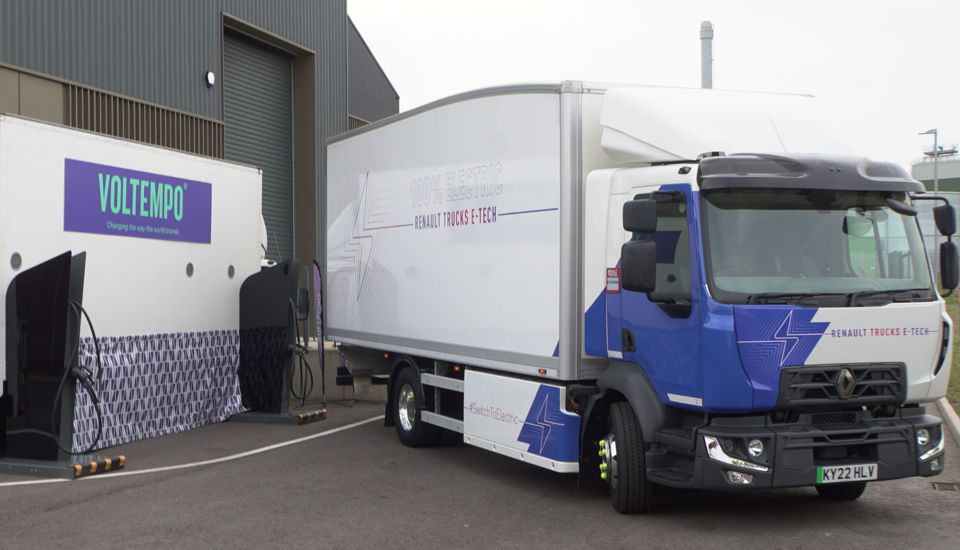Four trials involving the rollout of up to 370 zero emission heavy goods vehicles (HGVs) have been awarded a share of £200 million in Government funding.
The announcement is part of what the Government describes as a week of action to support the sector, with ministers visiting multiple freight stakeholders, to understand how the sector can continue to drive innovation and help the UK get closer to net zero.
The £200m Government funding, which will be delivered in partnership with Innovate UK through the zero emission HGV and infrastructure demonstrator programme, will also provide for around 57 new refuelling and electric charging sites.
Roads minister Richard Holden visited Voltempo in Birmingham yesterday (Wednesday, October 18), which is to receive a share of the funding, to see its eFreight 2030 project that will create up to 200 new jobs by 2030 and provide Birmingham with one of the UK’s first electric vehicle charging hubs dedicated to HGVs.
Sainsbury’s and Marks and Spencer will be using the new site to power electric vehicles (EVs) on their commercial fleets.
The eFreight 2030 project will receive £49.2m, which it says will help unlock an expected £500m of private investment.
Led by Voltempo, developers of the British designed and manufactured electric HGV megawatt charging system, the consortium will introduce 100 electric HGV 4x2 and 6x2 tractor units, and 32 new charging locations, all of which will have megawatt-charging capacity from day one.
As well as the nominated vehicle operators, the consortium includes a number of vehicles to be managed by the vehicle leasing company Vertellus as an extension of its EV Discovery Programme, which enables electric vehicle operation on a subscription basis.
This will allow other fleet operators and SMEs to join the programme as associate members of the consortium.

Michael Boxwell, CEO of Voltempo charging a Renault electric truck
Alongside the vehicle and charging offer, consortium member Dynamon will bring a full data and planning service using its Zero software package, allowing operators to both plan the most efficient use of their vehicle fleet, both diesel and electric, and analyse their business model to identify when specific vehicles or routes can be decarbonised.
Michael Boxwell, group CEO of Voltempo said: “We look forward to 2030 when electric commercial vehicles will be commonplace on our roads, and when we can look back on the value of the Government’s investment on Zero emission HGV and infrastructure demonstrator programme.”
Work on the project will begin in early 2024 and take seven years to complete.
The other projects that will receive a share of the £200m are Electric Freightway by Gridserve, Zero Emission North (ZEN) Freight and Hydrogen Aggregated Logistics (HyHaul) by Protium.
Holden said: “Freight and logistics are the beating heart of our economy and it is only right that we celebrate the sector so that it gets the recognition and support it deserves.
“From boosting zero emission tech across freight to attracting the future generation of talent to the industry, we are working hard to drive innovation, create jobs and grow the economy by building a brighter, more innovative future for one of our most crucial industries.”
Richard Smith, managing director of the Road Haulage Association (RHA), welcomed the funding for the zero emission HGV and infrastructure demonstrator programme.
“The £200m commitment Ministers are putting into this demonstrator significantly helps to de-risk the transition to net zero,” he said.
“The real-world demonstrators will answer many of the practical questions operators have and, in turn, give our members the confidence to invest in the zero emission lorries needed to drive down carbon emissions from our sector.”
An additional £2.4m has also been awarded through the second round of the Freight Innovation Fund (FIF).
As part of the fund, the FIF Accelerator – open for applications from today - will help up to 10 SMEs develop new ways to make freight greener, more efficient, and more resilient.
The £7m, three-year Freight Innovation Fund aims to scale up and roll out innovative technology across the industry to decarbonise freight.
Toby Poston, director of corporate affairs at the British Vehicle Rental and Leasing Association (BVRLA), said: "The journey to zero-emission HGVs is long and complex. Large vehicles require large investments and today’s news will help the HGV transition get out of first gear.
"Our latest Road to Zero Report Card found that technological uncertainty and a lack of infrastructure are leaving the sector reliant on a small group of brave trailblazers. That group is now able to grow. More trials and more case studies will breed confidence and show operators the routes to success."
Call for evidence
Freight Week alsos see the launch of two calls for evidence to continue exploring new ways for the freight industry to decarbonise and become more efficient.
The first is the call for evidence to inform and support the development of the zero emission HGV and coach infrastructure strategy, which is due to be published in 2024. This aims to ensure the delivery of the infrastructure required to meet the 2035 and 2040 phase out dates for non-zero emission HGVs.
The second is the call for evidence on volumetric concrete mixers (VCMs), which will consider whether a temporary weight allowance should remain, be removed or amended for the vehicles beyond the current deadline of 2028.
The call for evidence will consider the best options to reduce waste, limit costs and ensure fair competition while taking into account how to continue ensuring road safety.
With the Department for Transport (DfT) providing approximately £20m per year in freight revenue grants, the Government will also consider how to boost freight across a variety of modes.
The Mode Shift Revenue Support and Waterborne Freight Grant will be reviewed to explore how to continue helping the sector decarbonise by shifting freight from road to rail or water through the two schemes, it said.
October also marks the start of Year 2 of Generation Logistics, backed by £645,000 in Government funding across two years, which will be led by CILT and Logistics UK.
Generation Logistics
Following a successful first year, Generation Logistics will now focus on raising awareness of the logistics sector and its career opportunities specifically among young people in schools and colleges, in an effort to boost recruitment and retention of a more skilled and diverse workforce.
Kate Jennings, director of policy at Logistics UK, said: “Logistics underpins every sector of the UK economy and it is positive to see its importance being championed during Freight Week.
“As an industry committed to decarbonising, we welcome the investment through the Freight Innovation Fund, as well as the outcome of the zero emission HGV and infrastructure demonstrator programme.”





















Login to comment
Comments
No comments have been made yet.